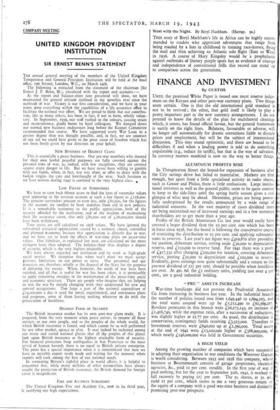FINANCE AND INVESTMENT
By CUSTOS UNTIL the promised White Paper is issued one must reserve judge- ment on the Keynes and other post-war currency plans. Two things seem certain. One is that the old international gold standard is not to be revived ; the other, that gold itself is likely to play pretty, important part in the new currency arrangements. I do not pretend to know the details of the plan for multilateral clearings which, it seems, has found official favour, but the general framework is surely on the right lines. Balances, favourable or adverse, will no longer call automatically for drastic corrections liable to disturb prices and employment, but will be the subject of international discussion. This may sound optimistic, and there are bound to be difficulties if and when a leading power is told to do something unpalatable (e.g., reduce its tariffs), but that is the way of salvation. In currency matters mankind is now on the way to better things.
ALUMINIUM PROFITS RISE In Throgmorton Street the hoped-for expansion of business after the City savings drive has failed to materialise. Markets are firm enough, but apart from a little specialised activity in radio shares, such as Cossor and Philco, there is little enthusiasm. Large institu- tional investors as well as the general public seem to be quite content to keep to the side-lines until the spring battle season gives a real glimpse of what may lie ahead. Meantime, prices are being power- fully underpinned by the results announced by a wide range of industrial concerns. In the vast majority of cases dividend rates are being maintained out of increased earnings and in a few instances shareholders are to get more than a year ago.
Profits of the British Aluminium Co. last year would easily have covered a larger dividend than the io per cent. rate which has been in force since 1938, but the board is following the conservative course of restricting the distribution to to per cent. and applying substantial sums to reserves. Last year's net figure was £419,870 after providing for taxation, debenture service, setting aside L5o,000 to depreciation reserve, and Li5o,000 to reserve fund. For 1941 there was a profit of £417,332 after charging £200,000 for taxation, covering debenture service, putting £50,000 to depreciation and Lioo,000 to reserve. Evidently, gross earnings rose quite substantially and a return to the pre-war dividend of 121 per cent. should be possible when hostilities are over. At 495. 6d. the Li ordinary units, yielding just over 4 per cent., are a good industrial holding.
" PRU " ASSETS INCREASE
War-time handicaps did not prevent the Prudential Assurance Co. from increasing its business last year. In the industrial branch the number of policies issued rose from 1,649,446 to 1,694,503, and the total sums assured were up by L5,212,490 to £62,369,287. Revenue premiums in this branch were £26,275,143, an increase of £1,416,740, while the expense ratio, after a succession of reductions, was slightly higher at 25.77 per cent. As usual, the distribution is conservative, contingency funds receiving £3,525,00o. Transfers to Investment reserves were £640,000 up at £1,390,000. Total assets at the end of 1942 were £13,000,000 higher at £388,900,000, of which nearly L146,000,00o was held in Government securities.
A HIGH YIELD
Among the growing number of companies which have succeeded in adapting their organisation to war conditions the Westover Garage is worth considering. Between 1933 and 1938 this company, whose business at Bournemouth consists of garage proprietors, electrical agencies, &c., paid II per cent. steadily. In the first year of war it paid nothing, but for the year to September 30th, 1942, it marked its full recovery by paying 12f per cent. The 5s. shares, at 5s. 9d., yield ix per cent., which seems to me a. very generous return on the equity of a company with a good war-time business and distinctly promising post-war prospects.
7 0 e.
n 0 d
2 3 6
ti sli
d
at
Si
is
0. et
e th


























 Previous page
Previous page